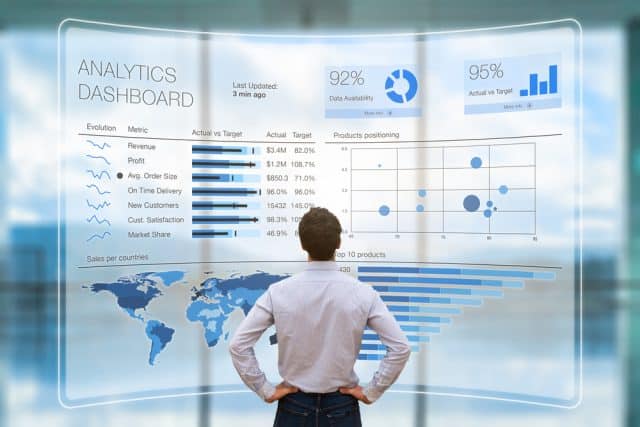Why data analytics will be vital in the hybrid working arena

A quick look at the Forbes Global 2000 will tell you that not many businesses stand the test of time. To endure throughout the ages, organizations must regularly adapt and reinvent themselves to keep up with new developments. Never has this received wisdom been more apt than throughout the COVID-19 pandemic, where many businesses have had to adjust their offerings and operations to stay relevant in the remote climate.
In the aftermath of the pandemic, this sentiment will continue to be vital. Indeed, as vaccination rates climb, and nations worldwide begin to ease their lockdowns and restrictions, many governments will be scrapping their 'work from home' guidelines. That said, this doesn’t mean companies plan to return to their old ways. As such, decision-makers will require a plan of action to make the decisions necessary to keep up with new trends.
In my view, data analytics should be imperative to informing any transformational changes. After all, without data, any business idea exists only in the abstract, without any sufficient proof of concept, or promise of success. Bolstered by figures and insights, however, organizations have a better chance of realizing their goals. This is a sentiment business leaders seem to acknowledge -- according to a recent survey from Soffos.ai, the majority (52 percent) of UK firms plan to up their investment in data analytics tools in the coming year.
With this in mind, what do decision-makers need to know about actionable business intelligence?
Data should work from the inside, out
All successful organizations will put people at the heart of their data strategy, and as such, it is important that change is led by the learning leaders responsible for upskilling the workforce and preparing employees for the future of work. Utilizing granular insights to tailor training initiatives will not only ensure that staff are being developed with their specific requirements in mind, but it will also enable a data-driven mentality to trickle through the business more generally.
For example, businesses should look to adopt technologies which put sophisticated learning management systems (LMS) to good work. Doing so will allow them to gain a comprehensive view of what individual staff members need to know to perform their roles well and clarify any knowledge gaps within teams. Based on regular participation in online training activities, these systems should be able to inform administrators as to which specific questions and tasks employees and departments found the most difficult, any areas of particular strength, as well as how often individuals are engaging with materials.
From there, learning leaders can harness the insights gained to tailor future schemes. If a particular sales employee was struggling to remember the USPs of a particular product, and training was provided with little effect on the company’s sales number, then a manager would likely be able to conclude that this training scheme needs more work. Likewise, if the same issue crops up amongst several members of the same team, the LMS should be able to flag some more targeted intervention for the specific individuals in this group.
As many individuals have struggled with the learning opportunities offered to them throughout the pandemic, with a third (33 percent) of employees surveyed by Soffos stating that they had been too generic to aid their professional development, these developments will not go amiss, ensuring that all voices are heard.
Robust data means good decision-making
From here, businesses might want to consider some other factors contributing to their data strategy, such as migrating their data to the cloud, unifying their data by breaking down data silos, and then planning to innovate using the insights harnessed throughout this process. Those tasked with implementing enterprise-wide IT strategies will find that analytics software that utilizes artificial intelligence (AI) and machine learning (ML) are able to assist in this process, taking much of the heavy grunt work away from busy teams.
First thing’s first, migrating data over to the cloud will ensure that businesses can scale up in a cost-effective manner, as the volume of data being captured grows. In doing so, they will be able to pay for only what they use, meanwhile information will be readily accessible to whoever requires it within the organization. This means that businesses will not only be equipped with all the tools needed to enable quick and informed decision-making, but also the insights to do so more effectively than ever.
Generally speaking, the more data an organization has to back up their decisions, the better -- however, some teams might have problems interpreting such a wealth of data, or struggle to know the right input information. This is where AI technologies are worth their weight in gold. A sub-division of AI, ML gives machines the ability to learn and improve through experience. In the context of data analysis, they carefully study information from different data points to detect patterns, before applying these fresh insights to predict future results. From determining customer trends, to predicting buying behavior and detecting fraud, AI-powered solutions empower businesses to efficiently spot challenges and maximize opportunities.
Whether organizations are keen to make smaller, internal changes, like overhauling their training schemes, or if they have greater designs in mind, such as a big investment, or a new venture, these algorithms will be able to put in the groundwork required to make these decisions with precision and agility.
As businesses find their feet in the new hybrid arena, this should serve as a reminder that data can be a great enabler of change and reinvention, particularly at times when organizations need some added assurance to bolster their decision-making. I look forward to seeing how organizations adopt data to transform their offerings and up their game.
Image credit: NicoElNino / Shutterstock

Nikolas Kairinos is the chief executive officer and founder of Soffos, the world’s first AI-powered KnowledgeBot. The platform streamlines corporate learning and development (L&D) to deliver seamless professional training for employees. You can follow him on LinkedIn and Twitter.